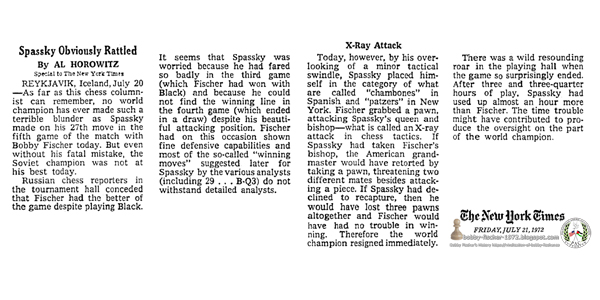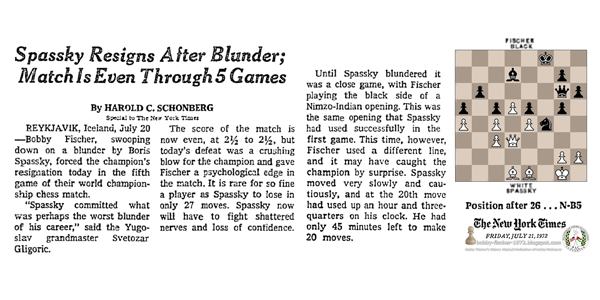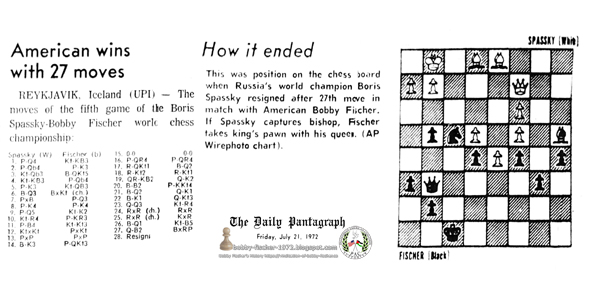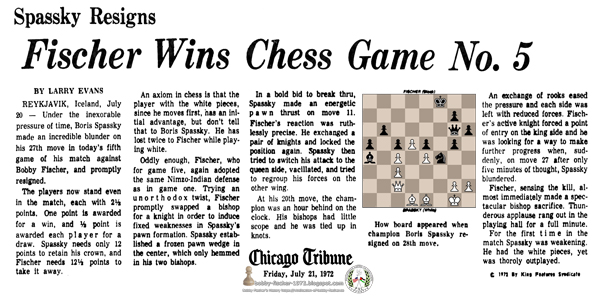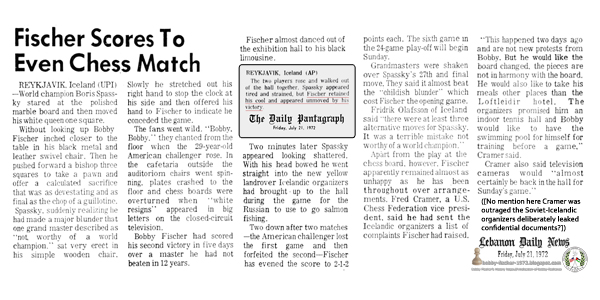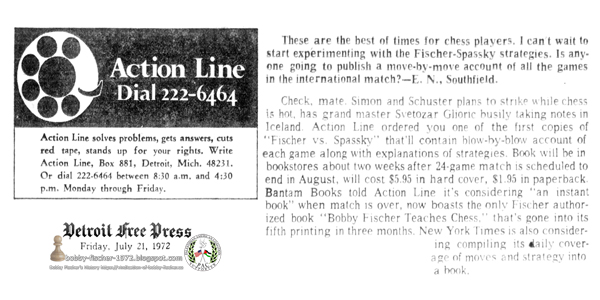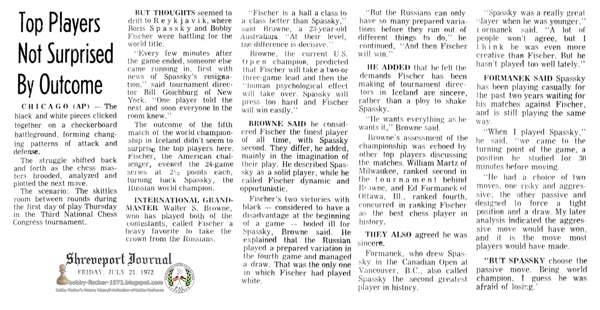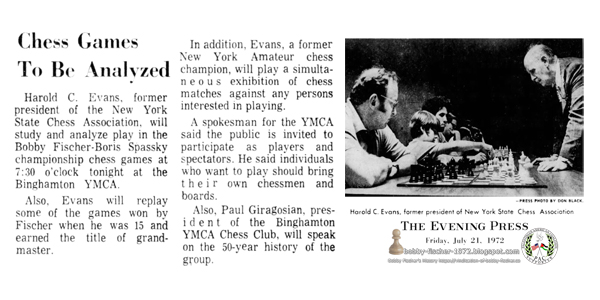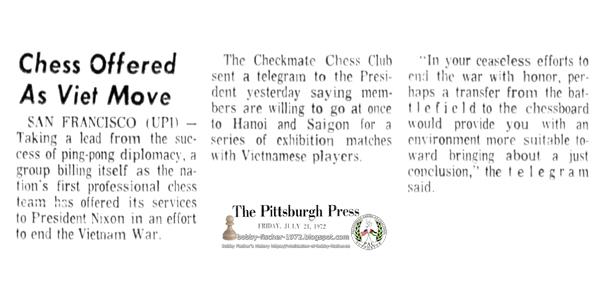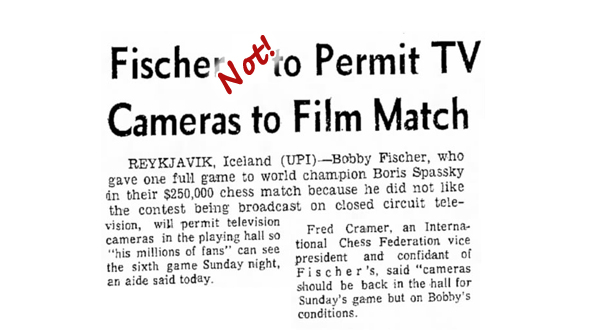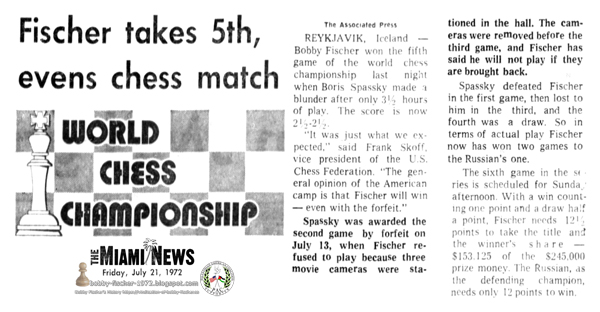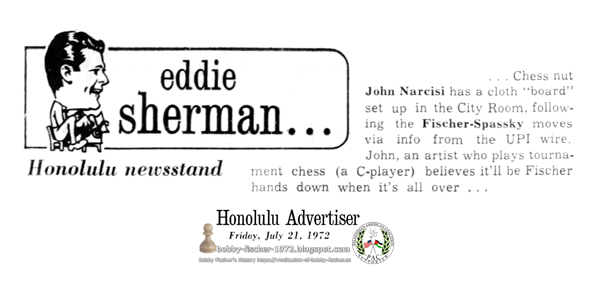New York Times, New York, New York Friday, July 21, 1972 - Page 32
Spassky Obviously Rattled by Al Horowitz
Reykjavik, Iceland, July 20—As far as this chess columnist can remember, no world champion has ever made such a terrible blunder as Spassky made on his 27th move in the fifth game of the match with Bobby Fischer today. But even without his fatal mistake, the Soviet champion was not at his best today.
Russian chess reporters in the tournament hall conceded that Fischer had the better of the game despite playing Black.
It seems that Spassky was worried because he had fared so badly in the third game (which Fischer had won with Black) and because he could not find the winning line in the fourth game (which ended in a draw) despite his beautiful attacking position. Fischer had on this occasion shown fine defensive capabilities and most of the so-called “winning moves” suggested later for Spassky by the various analysts (including 29 … B-Q3) do not withstand details analysts.
X-Ray Attack
Today, however, by his overlooking of a minor tactical swindle, Spassky placed himself in the category of what are called “chambones” in Spanish and “patzers” in New York. Fischer grabbed a pawn, attacking Spassky's queen and bishop—what is called an X-ray attack in chess tactics. If Spassky had taken Fischer's bishop, the American grandmaster would have retorted by taking a pawn, threatening two different mates besides attacking a piece. If Spassky had declined to recapture, then he would have lost three pawns altogether and Fischer would have had no trouble in winning. Therefore the world champion resigned immediately.
There was a wild resounding roar in the playing hall when the game so surprisingly ended. After three and three-quarter hours of play, Spassky had used up almost an hour more than Fischer. The time trouble might have contributed to produce the oversight on the part of the world champion.
([“While Fischer's feud with chess authorities made headlines, Spassky warred with Soviet officials in private. … Many observers thought Fischer's furor sapped Spassky's concentration, but Spassky says the job was done by Moscow.” — Sun-Sentinel, Thursday, August 8, 1985.])
New York Times, New York, New York Friday, July 21, 1972 - Page 1 & 32
Spassky Resigns After Blunder; Match Is Even Through 5 Games by Harold C. Schonberg
Reykjavik, Iceland, July 20—Bobby Fischer, swooping down on a blunder by Boris Spassky, forced the champion's resignation today in the fifth game of their world championship chess match.
“Spassky committed what was perhaps the worst blunder of his career,” said the Yugoslav grandmaster Svetozar Gligoric.
The score of the match is now even, at 2½ to 2½, but today's defeat was a crushing blow for the champion and gave Fischer a psychological edge in the match. It is rare for so fine a player as Spassky to lose in only 27 moves. Spassky now will have to fight shattered nerves and loss of confidence.
([“While Fischer's feud with chess authorities made headlines, Spassky warred with Soviet officials in private. … Many observers thought Fischer's furor sapped Spassky's concentration, but Spassky says the job was done by Moscow.” — Sun-Sentinel, Thursday, August 8, 1985.])
Until Spassky blundered it was a close game, with Fischer playing the black side of a Nimzo-Indian opening. This was the same opening that Spassky had used successfully in the first game. This time, however, Fischer used a different line, and it may have caught the champion by surprise. Spassky moved very slowly and cautiously, and at the 20th move had used up an hour and three-quarters on the clock. He had only 45 minutes left to make 20 moves.
As in previous games, it was Black that took the initiative. Spassky's play today, in the opinion of the experts, was curiously passive. Perhaps he was willing to make neutral moves, hoping Fischer would overreach himself, as in the first game. But Fischer applied more and more pressure, and Spassky broke.
On his 27th move the 35-year old Soviet grandmaster played Q-B2 and, while the experts in the audience at Exhibition Hall were studying the situation, Fischer pounced on Spassky's queen rook pawn. Spassky then had a choice of losing his bishop or walking into a mating net.
Had Spassky captured the bishop with his queen, Fischer could have taken White's king pawn with his queen, threatening immediate mate. White's queen could not have got back in time to prevent the mate or loss of material.
It took Spassky only a moment to realize what he had doe. He unhappily stood up and offered his hand. Fischer shook it, and both players went backstage.
Fischer Smiles
The audience of about 600 cheered the American grandmaster. Spassky waited before leaving.
During the day progress was made on the issue of film and television cameras within the hall — Fischer has objected strenuously to them—and it was clear that Chester Fox, who had purchased filming rights, was no longer connected with the match. ([Hence, the Soviet may now proceed with its plan to persecute Robert Fischer with lawsuit for $USD millions, out of its insatiable capitalist appetite for self-glorification, for the next decade. After all, Fischer never agreed to such terms with Chester Fox and his bulky crews of camera men. Rather, it was the Soviet-dominated Icelandic Federation who knowingly agreed to give priority to camera men, when the contract was emphatic: “…under the rules of a world championship tournament, Fischer had a right to demand the removal of the cameras and to refuse to play if they were not removed.” — U.S. Chess Federation Col. Ed Edmondson.])
And then there was the publication of Fischer's 14 Points, which the American delegation is calling a fuss over nothing.
Two days ago, Fred Cramer, Fischer's representative, sent the Icelandic Chess Federation what he calls “a punch list” of points that remain to be cleared. This checklist was either leaked or stolen.
([Makes one wonder what the long winding “punch list” of Soviet delegates would also be, since they have complained and made demands for years and never given the Soviet their due recognition for an unceasing flow of petty bickering and quibbles over nothing.])
It contained such items as the request for a private swimming pool, a new automobile, a wider choice of restaurants in which to dine, an indoor tennis court, pocket money to be paid in advance and a wider selection of current reading material than that available in his hotel, the Loftleider.
The Icelandic Chess Federation received six letters today from Cramer, amplifying the requests.
The request that seemed to intrigue most Icelanders was the one about the swimming pool. Fischer allegedly asked that the pool of his hotel be closed to the public at all times. This request was Point 8, and was specifically cited by the Icelandic Chess Federation.
The manager of the hotel, however, said today that this was the first he had heard of the request. Mr. Cramer said, in response to the pool issue that Fischer “only wanted to use it before game time.”
Mr. Cramer said that most of these 14 points were already taken care of. He expressed unhappiness that the list had been released. “I have been stabbed in the back,” he was reported as saying.
Results of negotiations in New York between Richard C. Stein and Paul Marshall, the lawyers for Mr. Fox and Fischer, respectively, indicate that something has been worked out.
New York Times, New York, New York Friday, July 21, 1972 - Page 32
Delight and Sympathy Mingled Among Marshall Club Observers
There was incredulity at the Marshall Chess Club here yesterday when Boris Spassky resigned to Bobby Fischer.
Some delight was expressed, too, because most of the 50 or 20 persons there were rooting for Fischer. But the delight seemed subdued. Indeed, when the result was learned at 4:40 P.M., the Fischer backers seemed quite stunned.
“Must be some mistake in transmission,” muttered Edmar Mednis, who stood by a gray, tin chessboard that was hung on a wall on which he charted the players' moves.
Telephone calls were quickly put through to Channel 13, and when the result was confirmed and double-checked, disbelief persisted.
“Not Spassky!” exclaimed one member. “Spassky doesn't make moves like that.”
A Rush To The Tables
And quickly, members and their guests rushed to the tables with chess sets and set about to find out what alternate moves Spassky could have made.
“It should have been queen to knight one instead of the queen to bishop two that Spassky made,” said Michael Edelstein, a hirsute young man who shook his head in disapproval.
“Bad move it was,” asserted Walter Goldwater, president of the club, which is at 23 West 10th Street.
Still, there was sympathy for Spassky.
“Pressure did it to him,” Larry D. Evans observed. “The game showed who was the better player. But Spassky could conceivably have played for a draw.”
The consensus seemed to be that Spassky had made the move in question for “inexplicable reasons.”
“It must have been some sort of momentary aberration,” Mr. Goldwater said. “Players like Spassky just don't falter like that.”
Then there were some arguments among members over Spassky's move. One said there was no way Fischer could not have won. Half of those present murmured agreement.
Then someone said that if only Spassky had moved his queen to knight one, the game would have ended in a draw eventually—but that, at least, there would have been a good chance for a draw.
The other half of the crowd seemed to agree with this view.
“The question now would be ‘Is Spassky Demoralized?’” Mr. Goldwater said. “That may very well be the key to the series. Petrosian was demoralized by just such a bad move, and Fischer won, eventually [in the eliminations.]”
As the evening wore on, the games continued in earnest. The sound of debate mixed with the sound of wooden pieces moved on wooden chess boards.
Tampa Bay Times St. Petersburg, Florida Friday, July 21, 1972 - Page 27
...Meanwhile, Chess Fans Back Home Contemplate
While Boris Spassky and Bobby Fischer contend for the world chess championship in Iceland amid fanfare and publicity, chess buffs back home continue to play in solitude and quiet contemplation. Mike Healy, 801 18th Ave. N, appears deep in thought planning the next move in a solitary game at the St. Petersburg Chess Club Thursday. Healy, a first-year student at St. Petersburg Junior College, said he thinks Fischer will win the chess title because “he comes up with some fantastic moves.”
The Pantagraph Bloomington, Illinois Friday, July 21, 1972 - Page 7
American Wins with 27 Moves
Reykjavik, Iceland (UPI)—The moves of the fifth game of the Boris Spassky-Bobby Fischer world chess championship:
How it ended
This was position on the chess board when Russia's world champion Boris Spassky resigned after 27th move in match with American Bobby Fischer. If Spassky captures bishop, Fischer takes king's pawn with his queen. (AP Wirephoto chart).
The Pantagraph Bloomington, Illinois Friday, July 21, 1972 - Page 7
Boris Evens Score
Reykjavik, Iceland (AP)—World chess champion Boris Spassky resigned Thursday night in his fifth championship game with American challenger Bobby Fischer, evening the match score at 2½ points each.
Spassky's resignation after 27 moves and 3½ hours of play stunned the spectators. He had been judged in a slightly weaker but not impossible position.
Spassky learned forward and stopped the clock, signifying the resignation. The spectators jumped to their feet and some shouted: “Bravo, Bobby.”
For the second time in the match, Spassky had been reduced to passivity.
With his 23rd move, Fischer invited the removal of all four rooks from the board, though there seemed to be more promising ideas in either transferring his king to his Q3 square or advancing his king's rook pawn.
Spassky's problems seemed to have eased, but his 27th move—Q-B1—was a blunder. Fischer's reply came with a crash. It was an unexpected sacrifice—BxRP—causing Spassky's position to collapse.
The two players rose and walked out of the hall together. Spassky appeared tired and strained, but Fischer retained his cool and appeared unmoved by his victory.
Frank Skoff, vice-president of the U.S. Chess Federation, remarked: “It was just what we expected. The general opinion of the American camp is that Fischer will win—even with the forfeit.”
Fischer lost the opening game, then forfeited the second when he failed to show in protest against filming of the 24-game title match. He came back in the third game for his first victory ever over Spassky, making the score 2-1.
The fourth game Tuesday was a draw, giving each contender half a point and making the score going into Thursday's game 2½ for Spassky and 1½ for Fischer.
The Russian chess champion, playing the white pieces, began with his favorite queen pawn opening. Fischer moved his knight to king's bishop three, developing a Nimzo-Indian defense. He played that strategy in the first game, which he lost.
Spassky sat hunched in concentration over the board, running his fingers through his hair.
Fischer seldom left the podium. He appeared confident. Slowly Spassky's position weakened until the final series of moves sealed his fate.
Chicago Tribune Chicago, Illinois Friday, July 21, 1972 - Page 2
Spassky Resigns: Fischer Wins Chess Game No. 5 by Larry Evans
Reykjavik, Iceland, July 20 — Under the inexorable pressure of time, Boris Spassky made an incredible blunder on his 27th move in today's fifth game of his match against Bobby Fischer, and promptly resigned.
The players now stand even in the match, each with 2½ points. One point is awarded for a win, and ½ point is awarded each player for a draw. Spassky needs only 12 points to retain his crown, and Fischer needs 12½ points to take it away.
An axiom in chess is that the player with the white pieces, since he moves first, has an initial advantage, but don't tell that to Boris Spassky. He has lost twice to Fischer while playing white.
Oddly enough, Fischer, who for game five, again adopted the same Nimzo-Indian defense as in game one. Trying an unorthodox twist, Fischer promptly swapped a bishop for a knight in order to induce fixed weaknesses in Spassky's pawn formation. Spassky established a frozen pawn wedge in the center, which only hemmed in his two bishops.
In a bold bid to break thru, Spassky made an energetic pawn thrust on move 11. Fischer's reaction was ruthlessly precise. He exchanged a pair of knights and locked the position again. Spassky then tried to switch his attack to the queen side, vacillated, and tried to regroup his forces on the other wing.
At his 20th move, the champion was an hour behind on the clock. His bishops had little scope and he was tied up in knots.
An exchange of rooks eased the pressure and each side was left with reduced forces. Fischer's active knight forced a point of entry on the king side and he was looking for a way to make further progress when, suddenly, on move 27 after only five minutes of thought, Spassky blundered.
Fischer, sensing the kill, almost immediately made a spectacular bishop sacrifice. Thunderous applause rang out in the playing hall for a full minute.
For the first time in the match Spassky was weakening. He had the white pieces, yet was thoroughly outplayed. © 1972 by King Features Syndicate
“More Chess Problems”
Reykjavik, Iceland (AP)—The Icelandic Chess Foundation today rejected a list of 13 Bobby Fischer demands.
“REJECTED?”
So “big and tough” for giving preferential treatment to Soviet comrades while disdaining Americans by leaking confidential documents to the press! for no other purpose than further smears of the American challenger.
“NOT REJECTED” because organizers say they're gonna “do all they could to meet Fischer's newest demands.” ([who's wishy-washy and unpredictable now? REJECTED. NOT REJECTED. REJECTED. NOT REJECTED.])
ICF president Gudmundur Thorarinsson said Fischer delivered his list of new demands. Thorarinsson said the demands had not been met.
Thorarinsson said wrong because Fred Cramer clarified he delivered the confidential list and stated he felt “stabbed in the back” after the stolen, or leaked, list was given to the press to make a circus over nothing, with Cramer clarifying most of the requests had ALREADY been dealt with!
…more American magazines and a new car.
Oh the crime!!
They will say or do anything to boast of Iceland's malignant Anti-American mistreatment of Fischer.
Next day, in the Cincinnati Enquirer, not a criticism uttered over the preferential treatment of the demanding Soviets: “During the match Spassky's new shining yellow Range Rover arrived at the playing hall. The Russian world champion has ordered a Rover to take back with him to Moscow.”
Where are the cynical reports flowing like a Tsunami over the Atlantic from Anti-American racist Iceland, spewing vitriolic castigation of the Soviet champion's demand for a new car to take back to Moscow, just as they have begrudged the same request by Fischer?
The Cincinnati Enquirer Cincinnati, Ohio Friday, July 21, 1972
The Sacramento Bee Sacramento, California Thursday, July 20, 1972
Council Grove Republican Council Grove, Kansas Thursday, July 20, 1972
Honolulu Star-Bulletin Honolulu, Hawaii Friday, July 21, 1972 - Page 25
Fischer and Spassky Now in Chess Tie
Reykjavik, Iceland (AP)—Bobby Fischer took the fifth game of the world chess championship last night after a bad blunder by Boris Spassky and only 3½ hours of play, evening the score at 2½-all.
“It was just what we expected,” said Frank Skoff, vice president of the U.S. Chess Federation. “The general opinion of the American camp is that Fischer will win—even with the forfeit.”
Spassky was awarded the second game by forfeit on July 13, when Fischer refused to play because three movie cameras ([accompanied by crews of disruptive camera men which were both visible and audible]) were stationed in the hall to film the match. The cameras were removed before the third game, and Fischer has refused to play if they are brought back.
Spassky defeated Fischer in the first game ([Fischer complained even then the disruptive men operating the cameras distracted his concentration]), then lost to him in the third, and the fourth was a draw.
SO IN terms of actual play, Fischer now has won two games to the Russian's one.
The sixth game in the 24-game series is scheduled for Sunday afternoon.
With a win counting one point and a draw half a point, Fischer needs 12½ points to take the title and with it $153,125 of the $245,000 prize money. The Russian, as the defending champion, needs only 12 points to keep his crown and collect the winner's share of the money.
Playing the white pieces yesterday afternoon, Spassky led with his favorite queen's pawn opening. Fischer went into a Nimzo-Indian defense, moving his knight to king's bishop three.
The first five moves repeated the first game, which Spassky won, then Fischer took a new tack, exchanged his bishop for a knight and steadily increased the pressure.
Another Soviet attempt to paint Fischer in the light of “Poor Sportsmanship” as a “sore winner”.
More of the same “Projection” we’ve come to expect from Soviet Propaganda.
Associated Press: “Fischer retained his cool and appeared unmoved by his victory.” — The Daily Pantagrah, Friday, July 21, 1972
in comparison with:
United Press International: “Fischer almost danced out of the exhibition hall to his black limousine.” — Lebanon Daily News, Friday, July 21, 1972
Lebanon Daily News Lebanon, Pennsylvania Friday, July 21, 1972 - Page 28
Fischer Scores To Even Chess Match
Reykjavik, Iceland (UPI)—World champion Boris Spassky stared at the polished marble board and then moved his white queen one square.
Without looking up Bobby Fischer inched closer to the table in his black metal and leather swivel chair. Then he pushed forward a bishop three squares to take a pawn and offer a calculated sacrifice that was as devastating and as final as the chop of a guillotine.
Spassky, suddenly realizing he had made a major blunder that one grand master described as “not worthy of a world champion,” sat very erect in his simple wooden chair. Slowly he stretched out his right hand to stop the clock at his side and then offered his hand to Fischer to indicated he conceded the game.
The fans went wild. “Bobby. Bobby.” they chanted from the floor when the 29-year-old American challenger rose. In the cafeteria outside the auditorium chairs went spinning, plates crashed to the floor and chess boards were overturned when “white resigns” appeared in big letters on the closed-circuit television.
Bobby Fischer had scored his second victory in five days over a master he had not beaten in 12 years.
Fischer almost danced out of the exhibition hall to his black limousine. ([In contrast with the Associated Press, whose account paints a whole different gentleman of Fischer “The two players rose and walked out of the hall together. Spassky appeared tired and strained, but Fischer retained his cool and appeared unmoved by his victory.”])
Two minutes later Spassky appeared looking shattered. With his head bowed he went straight into the new yellow landrover Icelandic organizers had brought up to the hall during the game for the Russian to use to go salmon fishing.
Two down after two matches—the American challenger lost the first game and then forfeited the second—Fischer has evened the score to 2½ points each. The sixth game in the 24-game play-off will begin Sunday.
Grandmasters were shaken over Spassky's 27th and final move. They said it almost beat the “childish blunder” which cost Fischer the opening game ([during which the Soviet and Icelandic organizers had arranged to impose a circus of disruptive camera crews throughout the auditorium on the challenger]).
Fridrik Olafsson of Iceland said “there were at least three alternative moves for Spassky. It was a terrible mistake not worthy of a world champion.” ([And Spassky said in 1985, that it was not Fischer who sapped his concentration. That job was done by Moscow, behind the scenes.])
Apart from the play at the chess board, however, Fischer apparently remained almost as unhappy as he has been throughout over arrangements. Fred Cramer, a U.S. Chess Federation vice president, said he had sent the Icelandic organizers a list of complaints Fischer had raised.
“This happened two days ago and are not new protests from Bobby. ([And, as reported in the New York Times on July 21, 1972, Cramer confirms most of the issues had already been resolved]). But he would like the board changed, the pieces are not in harmony with the board. He would also like to take his meals other places than the Loftleider hotel. The organizers promised him an indoor tennis hall and Bobby would like to have the swimming pool for himself for training before a game.” ([Further clarification from rumor mill news reports, Cramer stated for the New York Times, July 21, 1972: Fischer “only wanted to use it before game time.”])
Cramer also said television cameras would “almost certainly be back in the hall for Sunday's game.” ([No mention here Cramer expressed his outrage Soviet-Icelandic organizers allowed confidential documents to be stolen or leaked to the press to fuel further hype about Fischer.])
Detroit Free Press Detroit, Michigan Friday, July 21, 1972 - Page 1
Action Line
These are the best of times for chess players. I can't wait to start experimenting with the Fischer-Spassky strategies. Is anyone going to publish a move-by-move account of all the games in the international match?—E.N., Southfield.
Check, mate. Simon and Schuster plans to strike while chess is hot, has grand master Svetozar Gligoric busily taking notes in Iceland. Action Line ordered you one of the first copies of each game along with explanations of strategies. Book will be in bookstores about two weeks after 24-game match is scheduled to end in August, will cost $5.95 in hard cover, $1.95 in paperback. Bantam Books told Action Line it's considering “an instant book” when match is over, now boasts the only Fischer authorized book. “Bobby Fischer Teaches Chess,” that's gone into its fifth printing in three months. New York Times is also considering compiling its daily coverage of moves and strategy into a book.
Tucson Daily Citizen Tucson, Arizona Friday, July 21, 1972 - Page 45
Spassky's Error Akin to Fischer's in First Encounter by Isaac Kashdan, International Grand Master
Following is an analysis of the fifth Fischer-Spassky chess match written for the Associated Press by Isaac Kashdan, an international chess grandmaster.
Los Angeles (AP)—The fifth game of the world chess championship in Iceland was marked by as grievous an error by Boris Spassky as the ones that Bobby Fischer committed in their first encounter.
Spassky apparently had overlooked Fischer's reply when he made his 27th move. His choice of the square B2 for the queen was to protect his rooks pawn for the second time.
Fischer's BxP, based on a keen tactical point, forced an immediate inroad. If Spassky had captured the bishop, Fischer would have followed with QxP. He would then threaten mate on the move in two ways, and there would be no adequate defense.
Failure to take the bishop would also be of no avail to Spassky. He would have to move his queen. Fischer would exchange bishops, and again QxP would follow. Spassky recognized his helplessness by resigning at once.
Both players followed the pattern of their first game until Spassky's sixth move. Fischer then varied. Instead of playing for a balanced pawn formation and a series of exchanges, as in the first game, Fischer took a course that seemed inferior.
He exchanged his bishop for a knight and allowed Spassky a more advanced pawn center. On the other hand, Spassky's queen-side pawns were separated and proved weak.
Spassky's 11th move probably was an inferior advance, which caused problems later. It left his king's pawn backwards, in a manner similar to the situation in the third game.
Spassky could not coordinate his pieces and his two bishops were ineffective, blocked by pawns on both sides. After the rooks were exchanged, Fischer had better prospects.
The game was still tenable for Spassky, however, until his final oversight. Necessary was 27. Q-B3. He could then continue with B-QB2 and Q-Q1, if necessary to defend the weak pawn.
In the report on the fourth game, this writer stated that Spassky could have won by Q-Q3 on his 29th move. Actually, Fischer had a defense by NB5ch, and if PxN, 31. QxPch would force a draw by perpetual check.
Elapsed time: Spassky white, 130 minutes; Fischer black, 77 minutes.
The Evening Sun Baltimore, Maryland Friday, July 21, 1972 - Page 3
Spassky Relaxes, Tries to Forget Game 5 Blunder by Julie Flint
Reykjavik, Iceland (AP)—Within hours after making what experts consider one of the most costly mistakes of his long chess career, Soviet world champions Boris Spassky was out playing tennis with one of his seconds today.
Dressed in shorts and a gray pullover, the Russian looked quite untroubled by the blunder that gave the fifth game to his title defense to Bobby Fischer Thursday night. That tied the score at 2½ points each in the 24-game match.
“Everything is normal,” said Spassky.
He revealed he was writing a book about his lost games. Now, he said he had another chapter.
“I am amazed he is not in his hotel analyzing,” said Dimitri Bjelica, Yugoslav chess commentator and Spassky's friend. “It now looks bad for him. In the last three games he has lost twice and drawn once.”
Spassky resigned after his 27th move and 3½ hours of play.
After his win, Fischer made one of his rare sorties from his hotel room. The American dined at Reykjavik's smart restaurant, Norse. His official representative, Fred Cramer, said he was in good spirits.
“Bobby always expects to win,” he added.
Grandmasters and buffs were trying to explain Spassky's mistake.
Some suggested he was worried by the amount of time he was taking over his game. After 20 moves, the world champion tapped Fischer on his clock, having taken one hour longer in play. On resigning he had 20 minutes left.
The Rev. William Lombardy, Fischer's second, observed: “It appears Spassky was not so well prepared as before.”
Cramer, however, said Spassky had made “a sophisticated mistake.” Bobby, he added, “had the game under control right from the beginning, although it may not have looked like it to everyone.”
Indeed, many thought Spassky, moving first with the white pieces, had the edge until half way through the game when Fischer began to bring the board firmly under his control.
The Icelandic Chess Federation confirmed reports that Chester Fox of New York, buyer of exclusive filming rights to the championship match, would not be shooting the rest of the games.
This was now under control of Chet Forte of the American Broadcasting Co. under an agreement worked out in New York by lawyers for Fox and Fischer.
“Bobby has confidence in Forte,” Cramer said. “He is a professional.”
President Gudmundur Thorarinsson of the Icelandic Federation, said he believed Fox would not lose money under the new agreement. He said he did not expect the federation to have to reimburse Fox, who is reported to have invested $70,000.
Fischer's victory Thursday was no surprise to the American contingent.
“It was just what we expected,” said Frank Skoff, vice-president of the U.S. Chess Federation. “The general opinion of the American camp is that Fischer will win—even with the forfeit.”
Spassky was awarded the second game by forfeit on July 13, when Fischer refused to play because three movie cameras ([and crews of disruptive men hired to operate them]) were station in the hall to film the match ([“Colonel Edmondson said that under the rules of a world championship tournament, Fischer had a right to demand the removal of the cameras and to refuse to play if they were not removed.”—New York Times, 7/20/1972]). The cameras were removed before the third game, and Fischer has refused to play if they are brought back.
Spassky defeated Fischer in the first game, then lost to him in the third, and the fourth was a draw. So in terms of actual play Fischer now has won two games to the Russian's one.
The sixth game in the 24-game series is scheduled for Sunday afternoon. With a win counting one point and a draw half a point. Fischer needs 12½ points to take the title and with it $153,125 of the $245,000 prize money, while the Russian as the defending champion needs only 12 points to keep his crown and collect the winner's share of the money.
Playing the white pieces Thursday afternoon, Spassky led with his favorite queen's pawn opening. Fischer went into a Nimzo-Indian defense, moving his knight to king's bishop three.
The first five moves repeated the first game, which Spassky won, then Fischer took a new tack, exchanged his bishop for a knight and steadily increased the pressure.
Spassky doomed himself on his 27th move, moving his queen to square B2 to protect his rooks pawn. Fischer seized on the opportunity.
The champion appeared tired and strained as he stopped the clock to signify defeat, stood up and shook hands with Fischer. The audience of about 600 roared with excitement. “Bravo! Bobby!” some shouted.
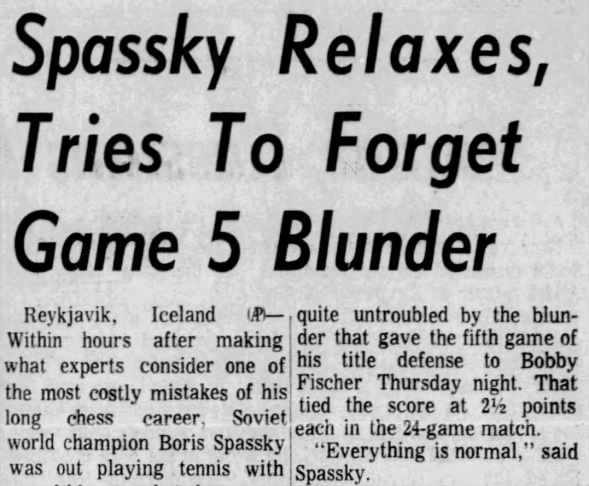 Spassky Relaxes, Tries to Forget Game 5 Blunder 21 Jul 1972, Fri The Evening Sun (Baltimore, Maryland) Newspapers.com
Spassky Relaxes, Tries to Forget Game 5 Blunder 21 Jul 1972, Fri The Evening Sun (Baltimore, Maryland) Newspapers.com
The Shreveport Journal Shreveport, Louisiana Friday, July 21, 1972 - Page 18
Top Players Not Surprised By Outcome
Chicago (AP)—The black and white pieces clicked together on a checkerboard battleground, forming changing patterns of attack and defense.
The struggle shifted back and forth as the chess masters brooded, analyzed and plotted the next move.
The scenario: The skittles room between rounds during the first day of play Thursday in the Third National Chess Congress tournament.
BUT THOUGHTS seemed to drift to Reykjavik, where Boris Spassky and Bobby Fischer were battling for the world title.
“Every few minutes after the game ended, someone else came running in, first with news of Spassky's resignation,” said tournament director Bill Goichburg of New York. “One player told the next and soon everyone in the room knew.”
The outcome of the fifth match of the world championship in Iceland didn't seem to surprise the top players here. Fischer, the American challenger, evened the 24-game series at 2½ points each, turning back Spassky, the Russian world champion.
INTERNATIONAL GRANDMASTER Walter S. Browne, who has played both of the contestants, called Fischer a heavy favorite to take the crown from the Russians.
“Fischer is a half a class to a class better than Spassky,” said Browne, a 23-year-old Australian. “At their level, the difference is decisive.”
Browne, the current U.S. Open champion, predicted that Fischer will take a two-or-three game lead and then the “human psychological effect will take over. Spassky will press too hard and Fischer will win easily.”
BROWNE SAID he considered Fischer the finest player of all time, with Spassky second. They differ, he added, mainly in the imagination of their play. He described Spassky as a solid player, while he called Fischer dynamic and opportunistic.
Fischer's two victories with black—considered to have a disadvantage at the beginning of a game — boded ill for Spassky, Browne said. He explained that the Russian played a prepared variation in the fourth game and managed a draw. That was the only one in which Fischer had played white.
“But the Russians can only have so many prepared variations before they run out of different things to do,” he continued, “And then Fischer will win.”
HE ADDED that he felt the demands Fischer has been making of tournament directors in Iceland are sincere, rather than a ploy to shake Spassky.
“He wants everything as he wants it,” Browne said.
Browne's assessment of the championship was echoed by other top players discussing the matches. William Martz of Milwaukee, ranked second in the tournament behind Brown, and Ed Formanek of Ottawa, Illinois, ranked fourth, concurred in ranking Fischer as the best chess player in history.
THEY ALSO agreed he was sincere.
Formanek, who drew Spassky in the Canadian Open at Vancouver, B.C., also called Spassky the second greatest player in history.
“Spassky was a really great player when he was younger,” Formanek said. “A lot of people won't agree, but I think he was even more creative than Fischer. But he hasn't played too well lately.”
FORMANEK SAID Spassky has been playing casually for the past two years waiting for his matches against Fischer, and is still playing the same way.
“When I played Spassky,” he said, “we came to the turning point of the game, a position he studied for 30 minutes before moving.
“He had a choice of two moves, one risky and aggressive; the other passive and designed to force a tight position and a draw. My later analysis indicated the aggressive move would have won, and it is the move most players would have made.
“BUT SPASSKY chose the passive move. Being world champion, I guess he was afraid of losing.”
The Town Talk Alexandria, Louisiana Friday, July 21, 1972 - Page 15
Fifth Game at End
This is the way the board appeared at the end of the fifth game in the world chess championship Thursday night in Reykjavik, Iceland. U.S. Grand Master Bobby Fischer won the game, forcing world champion Boris Spassky of the Soviet Union to resign on the 28th move. (UPI Telephoto)
Dayton Daily News Dayton, Ohio Friday, July 21, 1972 - Page 5
World Champion Russian Loses In Rare Low Number of Moves
Reykjavik, Iceland —(AP)—Moves in the fifth game of the world chess championship match between Boris Spassky and Bobby Fischer, (Spassky-white, Fischer-black).
Spassky resigns. Elapsed time: Spassky, white, 130 minutes; Fischer black, 77 minutes.
Caption: Position of pieces as Spassky Resigns Game After 27th Move: Fischer's Win Evened Championship Score at 2½ Games for Each. — Daily News Photo by Bill Shepherd
Daily News New York, New York Friday, July 21, 1972 - Page 4
Bobby Bags 28-Move Victory by Robert Byrne
Reykjavik, Iceland, July 20—World titleholder Boris Spassky of Russia blundered at the 27th move today in game five of his world championship chess match tonight with Bobby Fischer of Brooklyn and had to give up after the 29-year-old American replied with a haymaker to even up the match at 2½ games apiece.
After Fischer played his 27th move, a bishop to his queen's rook taking a pawn, Spassky looked intently at the table for a full minute. Then he looked up at Fischer and held out his hand.
The spectators went wild, stamping their feet, clapping hands and yelling, “Bobby! Bobby!” chess enthusiasts in the cafeteria following the moves relayed from the hall hurled plates, saucers and glasses into the air.
A Sudden Collapse
The 35-year-old champion had become enmeshed in difficulties in holding off possible attacks on his weak pawn position, but his sudden collapse on the 27th move, after about 3½ hours of play, was not expected. It took Spassky only a moment to decide that continuing the game would be hopeless.
Fischer's smashing bishop sacrifice could not be accepted for 28. Here's how the moves would have gone: 28. QxB QxP; 29. K-B2 N-Q6ch; 30. K-N3 Q-R6ch; 31. K-B3 Q-B5ch; 32. K-K2 N-B8 would have been checkmate. Refusing the offer by 28. Q-N1 BxB; 29. QxB QxP would have left the battered Spassky two pawns down and given him no chance to halt the further decimation of his remaining pawns.
Earlier Fischer had reverted to the Nimzo-Indian defense which he had employed against Spassky in the first game of the $250,000 match. But this time he followed up by doubling the Russian's queen's bishop pawn and set up a blockage which fixed the weaknesses of the enemy pawn formation.
Spassky's attempt to gain attacking room at his 11th move faltered against Bobby's ingenious reply which virtually forced the exchange of knights, giving Fischer a free position.
Although Spassky got a protected passed pawn by his exchange at the 13th move, he remained encumbered by the necessity of keeping a watchful eye on the three shaky pawns at Qr4 Qb4 and K4. He had to try either Q-K3 Q-B2 or Q-N1 at the 27th move, but whether his game would have been tenable in the long run is doubtful.
The American played methodically and fairly quickly, which Spassky took his time over each move and spent 105 minutes completing his first 20.
Arbiter Lothar Schmid said Spassky's position was hopeless when Fischer made his 27th move.
“I knew it was coming,” Schmid said. “In fact, I was ready to get off my chair any moment.
The Experts Stunned
The fact that Fischer had now won two games playing black stunned the experts.
“We thought Fischer was a master of attacking chess,” said one international grandmaster. “Now he has turned out to be a genius of defense.”
Spassky's second, Svetozar Gligoric, said the actual turning point came on the 25th move, when Spassky chose the wrong plan and doubled his rooks on the king's bishop rank.
“A Terrible Mistake”
“It was a terrible mistake for a world champion,” Gligoric said. “It ranked with the blunder Fischer came up with in the first game.” ([while distracted by bulky cameras operated by disruptive crews of men])
Fischer had allowed his lone bishop to become trapped in the first game and resigned to Spassky on the 56th move.
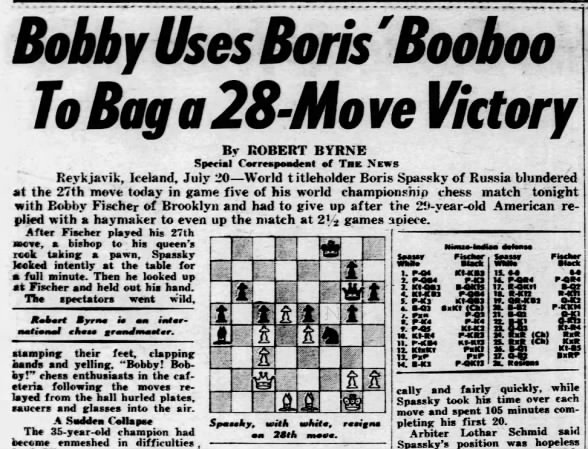 Bobby Bags 28-Move Victory 21 Jul 1972, Fri Daily News (New York, New York) Newspapers.com
Bobby Bags 28-Move Victory 21 Jul 1972, Fri Daily News (New York, New York) Newspapers.com
Press and Sun-Bulletin Binghamton, New York Friday, July 21, 1972 - Page 2
Chess Games To Be Analyzed
Harold C. Evans, former president of the New York State Chess Association, will study and analyze play in the Bobby Fischer-Boris Spassky championship chess games at 7:30 o'clock tonight at the Binghamton YMCA.
Also, Evans will replay some of the games won by Fischer when he was 15 and earned the title of grandmaster.
In addition, Evans, a former New York Amateur chess champion, will play a simultaneous exhibition of chess matches against any persons interested in playing.
A spokesman for the YMCA said the public is invited to participate as players and spectators. He said individuals who want to play should bring their own chessmen and boards.
Also, Paul Giragosian, president of the Binghamton YMCA Chess Club, will speak on the 50-year history of the group.
The Pittsburgh Press Pittsburgh, Pennsylvania Friday, July 21, 1972 - Page 7
Chess Offered As Viet Move
San Francisco (UPI)— Taking a lead from the success of ping-pong diplomacy, a group billing itself as the nation's first professional chess team has offered its services to President Nixon in an effort to end the Vietnam War.
The Checkmate Chess Club sent a telegram to the President yesterday saying members are willing to go at once to Hanoi and Saigon for a series of exhibition matches with Vietnamese players.
“In your ceaseless efforts to end the war with honor, perhaps a transfer from the battlefield to the chessboard would provide you with an environment more suitable toward bringing about a just conclusion,” the telegram said.
El Paso Herald-Post El Paso, Texas Friday, July 21, 1972 - Page 1
Fischer Certainly Will NOT Permit Disruptive Crews of Men Operating Bulky TV Cameras
USSR selecting Anti-American, Racist Iceland who restricted entry of blacks and news coverage…
2nd Game Camera Boycott? “instead of..video tape film that didn't make any noise they had guys with film cameras that were..all around..making a racket..and visually you could see them moving around.”- R.J. Fischer
“Under agreed rules of the match, [Fischer] had the right to object and to demand removal of the cameras if they disturbed him.” (7/21/1972) -Col. Ed Edmondson, USCF
Fischer's personal representative, “Fred Cramer, said the 29-year-old American challenger ‘has not changed his mind’ about his objections. Fischer claims the ([disruptive men operating large, bulky television]) cameras disturb his concentration.” (7/20/1972) — The Lexington Herald Lexington, Kentucky
Courier-Post Camden, New Jersey Friday, July 21, 1972 - Page 34
Spassky Seen Cracking Under Fischer Attack by Dr. Leroy Dubeck, President, U.S. Chess Federation
With the world chess championship games between U.S. Grandmaster Bobby Fischer and Russia's titleholder Boris Spassky, now even, observers see Spassky cracking under the pressure.
Yesterday's game lasted only 28 moves. Spassky resigned immediately after making a blunder in an inferior position.
This blunder was probably caused by the intense pressure under which Spassky is playing. After starting with a 2-0 advantage (one game was lost by Fischer by forfeit). Spassky has lost both games in which Fischer has played an opening innovation. This despite the fact that Spassky had the white pieces in both games, which is considered an advantage as white moves first.
Meanwhile, in the fourth game Fischer survived a carefully analyzed opening trap of the Russians.
I suspect that Spassky's morale is rather low due to his dismal performance. He may well make further blunders under the pressure and no doubt the criticism of his grandmaster seconds. These seconds help the competitor prepare opening surprises for his opponent and also aid him in analyzing the adjourned position, if one occurs.
Fischer's second is Father William Lombardy, a priest from New York City. Lombardy is in his mid thirties and is one of America's best chess grandmasters. He was once world junior chess champion and perhaps might have become a contender for the world chess championship if he had devoted himself exclusively to chess.
He has known Fischer for many years and agreed to act as Fischer's second on very short notice. In fact, he originally planned to host a TV series on the Fischer-Spassky match since Fischer apparently intended to play without a second. When Fischer asked him to go as his second a couple of days before the match was scheduled to start, Lombardy agreed and I am sure that he will do a splendid job.
Father Lombardy played for the United States Chess Team in the 1970 Olympics and had the best score of any of the six American players. Fischer included. However, he did play on a lower board than Fischer and consequently faced weaker opposition.
Fischer's sixth move is something of an opening innovation.
If Spassky played 28. QxB then QxP threatens both checkmate on Spassky's K-N2 as well as threatening QxBch. Mate can not be avoided. An incredible error for the World Chess Champion!
The Ottawa Citizen, Ottawa, Canada, Friday, July 21, 1972: “Fischer himself seemed to be less nervous. For the first time he has been seen walking out alone on the open fields around the airport and next to his hotel. ([Fischer previously had threats issued on his life and lives of foreign reporters visiting Iceland, which is renown for its Anti-American xenophobia and racism.])
Spassky appeared to be exhausted when he resigned.
Two members of his supporting team, which includes four grandmasters, were waiting for him in a car. The words exchanged could not be heard or understood but they appeared to be harsh. All were obviously downcast.”
South Florida Sun Sentinel, Fort Lauderdale, Florida, Thursday, August 08, 1985: “While Fischer's feud with chess authorities made headlines, Spassky warred with Soviet officials in private. … Many observers thought Fischer's furor sapped Spassky's concentration, but Spassky says the job was done by Moscow.”
The Vincennes Sun-Commercial Vincennes, Indiana, Friday, July 21, 1972 - Page 3
FISCHER WINS!
Russian in Pinch — This was the position of chess pieces when Boris Spassky resigned Thursday, giving the fifth game of his match with Bobby Fischer to the latter. (AP Wirephoto)
Contra Costa Times Walnut Creek, California Friday, July 21, 1972 - Page 1
Fischer Evens Chess Series
Reykjavik, Iceland — World championship chess player Boris Spassky resigned in his fifth title game with American Bobby Fischer Thursday in Reykjavik, Iceland. The Russian resigned after three and one-half hours of play as the American leveled his score with Spassky at two and one-half points each. Spassky's resignation brought a roar of astonishment from the crowd in the huge auditorium in Reykjavik. Spassky's resignation came as a complete surprise. Yugoslav grandmaster Dragoljub Yanosevic, however, said Spassky made a grave mistake on the 25th move “that had to cost him the game.”
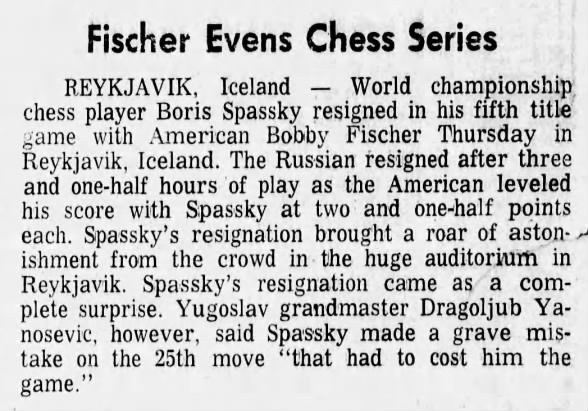 Fischer Evens Chess Series 21 Jul 1972, Fri Contra Costa Times (Walnut Creek, California) Newspapers.com
Fischer Evens Chess Series 21 Jul 1972, Fri Contra Costa Times (Walnut Creek, California) Newspapers.com
Evening Herald Shenandoah, Pennsylvania Friday, July 21, 1972 - Page 4
Contest's The Thing
A lot of cryptic stuff like this is coming out of Iceland these days: “53. K-B5 K-Kt4; 54. KxP KxP; 55. K-Q5 K-Kt4; 56. K-Q6 Resigns.” That is the windup of the first game in the Spassky-Fischer world championship chess match.
Few Americans—perhaps not one in 1,000, or even more—read such game records with understanding, let alone relish. Yet Americans are showing great interest in the match. This may not be so hard to explain.
The principals—in particular Fischer, a man of many idiosyncrasies—are intriguing. Then too, it matters less what the game is than that we have here a trial of strength between the two top players in all the world. Even people who aren't quite sure what “K-R5, K-B4” means, and don't much care, are keen to know the outcome of this prolonged chessboard struggle.
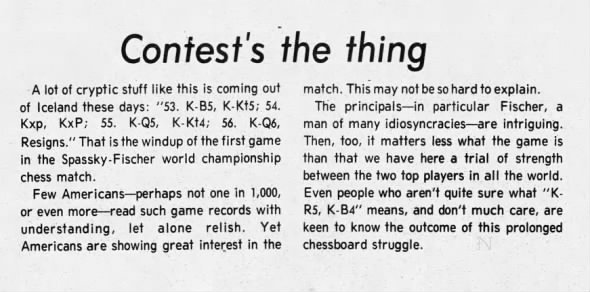 Contest's The Thing 21 Jul 1972, Fri Republican and Herald (Pottsville, Pennsylvania) Newspapers.com
Contest's The Thing 21 Jul 1972, Fri Republican and Herald (Pottsville, Pennsylvania) Newspapers.com
Evening Standard London, Greater London, England Friday, July 21, 1972 - Page 17
Did Bobby Turn on Evil Eye? by Leonard Barden
WHAT's WRONG with Boris? Chess masters in Reykjavik and the huge audiences of Russians following the world title match on open-air boards in Moscow are all asking the same question after last night's fifth game.
Boris Spassky has seen his comfortable two-point lead over Bobby Fischer wiped out in the space of four days while the challenger has grown in confidence. Bobby has won twice with the black pieces, and in world chess early wins with black are a frequent pointer to the eventual match victor.
Fatal Move
Gligoric, the Yugoslav Grand Master, called the fatal 27th move, Q-B2, the worst blunder of Spassky's career. After Fischer's reply BxP, Spassky cannot play 28. QxB, because then QxP threatens two checkmates simultaneously.
If White escapes from both mates by 29. K-B2, then N-Q6 wins Spassky's bishop.
If Spassky declines Fischer's bishop sacrifice and moves his attacked queen, then Fischer still wins quickly by swapping bishops followed by QxP.
Fischer has shown astute chess psychology by choosing a different reply each time to the queen's pawn opening which is Spassky's favourite.
Below Form
Before the match all the experts thought that Fischer was vulnerable against the queen's pawn, but he has made waste paper of all the thick Russian dossiers on his pet variations by switching to new systems in the Nimzo-Indian and Benoni openings.
Only in the fourth game of the match has Spassky caught Fischer out in the opening, and then the world champion botched a winning position.
Chess masters will be seriously asking now whether Bobby Fischer has a sort of evil eye which makes his opponents blunder.
Fischer's three previous defeated rivals in the world title elimination matches all, like Spassky, played well below form.
Taimanov and Larsen had high blood pressure during their matches with Fischer, while Petrosian had to take a rest because of nervous exhaustion.
I would not be surprised if Spassky appeared with a doctor's certificate before the next game scheduled for Sunday. Meanwhile the Russians may make a protest of their own before long again at Fischer's special swivel chair which enables him to spin around in his seat between moves in Spassky's field of vision.
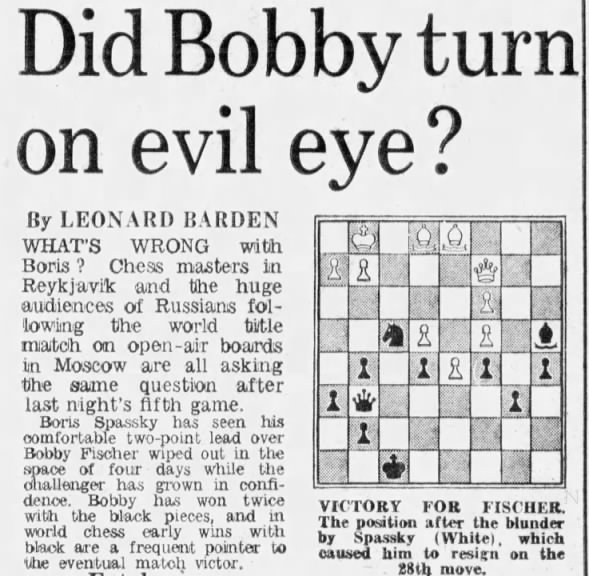
The Boston Globe Boston, Massachusetts Friday, July 21, 1972
“They are aware that I am going to win and they want the least possible exposure. Iceland is one place that it is not possible even to use a television satellite.
“Chess is a big propaganda vehicle with the Russians.” - Robert J. Fischer, June 06, 1972.
([The geography of Iceland made it difficult for world press to cover the tournament and simple for the Soviet Union to isolate the tournament from factual coverage. Limited correspondents attended, which enabled the USSR to control the narrative and flow of information.])
“To the Russians, Fischer insisted, chess was a propaganda vehicle by which the Soviets attempted to show that Communist minds were the best in the world.” - August 08, 1972
Can You Recognize Soviet Propaganda? Robert Fischer Did. Soviet Caricature of Fischer Scorned in Far East by Crocker Snow, Jr., Globe Asian Bureau
In Asia, with the American government's reputation tarnished anew by the continued bombing campaign of North Vietnam ([but Soviet USSR kept it quite secret Soviet troops were present in Viet Nam fanning the flames of war]) and the persistent stories of dams and dikes coming under attack, it is now the turn of Mr. American as such who finds his reputation badly soiled by SOVIET CARICATURE of the cerebral chess player from Brooklyn ([stories based on exaggerations, fabrications and mangled renditions of actual events. Attempts to distort the fact the Soviets brought in an army of disruptive camera operators to throw points in their own favor then break the rules, and refuse to remove the disruptions. Sordid petty acts of poor sportsmanship from the Soviet's chess propaganda vehicle.])
Fischer's ([attributed by the many Soviet myths manufactured in Moscow]) during the last three weeks have filled Asia with an image of American arrogance, avarice and downright ill manners. ([Including Moscow's ill-mannered and inhospitable selection of Iceland, with historical Anti-American intolerance, as well as Racist, forbidding entry by persons of black race.]) By contrast, Russian opponent Boris Spassky comes across as a cultured, civilized, and most of all patient comrade and competitor.
Surprisingly, the Fischer-Spassky matchup in Reykjavik has occasioned lots of attention on this side of the Pacific where such board games as Chinese “Mahjong” and Japanese “Go” are far more popular than chess. ([What were these Soviet opinions on Icelandic Fascists issuing threats on the lives of Fischer, and “foreign reporters” such as themselves, issuing ultimatum to “leave Iceland in 8 hours or be s**t?” was relayed from Reykjavik, but no, Moscow is silent.])
Spot coverage by newspapers and television provides timely news of all the latest developments. And ([Manufactured in Moscow Caricature]) of Fischer has engendered a spate of anti-American editorials all over East Asia.
Even in the Indian subcontinent early this month, the Fischer story got almost as much press attention as the Democratic national convention in Miami.
Among the many English language papers in New Delhi, the event has allowed the not so nascent political anti-Americanism to come to the fore as personal anti-Americanism too.
In Dacca, the “Bangladesh Observer” and other papers have devoted some space in their precious six to eight pages daily to uncomplimentary stores about the Iceland match.
The Tokyo press has covered the story closely, as it does most any happening concerning America, but the editorials have been restrained, and some even sympathetic to Fischer, picturing him as something of a tortured genius. ([Or, as more to the point, knowing that half the rubbish churned out in the world press is propaganda, fictionalized, hyperbole and those knowing Fischer personally, knew better.])
In pro-American Bangkok, the English language papers have had a field day.
The city's most independent “The Nation,” offered a long editorial last week under the title “Fischer is not worth admiring,” ([and to set the record straight, “The Soviet Empire crashed and burned because it was built on the backs of peasants. Fueled on the blood, sweat and tears of its most vulnerable citizens. USSR selecting Anti-American, Racist Iceland who restricted entry of blacks and news coverage. Fails to elaborate on the finicky, overbearing demands and complaints of European organizers who refused for months to work out details pre-match. Belgrade's illegal demand of 35K USD “guarantee” refused by USCF! Australia's legal $225K bid snubbed by Russia, threatening they “would not play”. Schemes to disqualify Fischer and replace with Petrosian, etc. Unleashing a flood of daily distortions of events, nonsensical rubbish made up from thin air, but calling it “News” from behind the Iron Curtain of the Soviet controlled Icelandic Chess Federation!]) which concluded that: “Potential world champions (Fischer) should not only have the skill to reach such heights, but also have the character ([perhaps character defamation by Soviets]) so that the rest of the world can look upon them admiringly. Whether he wins or not, Fischer does not qualify to be a world champion.” ([End of the Rehashed Soviet Anti-American tirade, taken out on a simple chess player in an overreaching display of Soviet arrogance and piss poor sportsmanship]).
Detroit Free Press Detroit, Michigan Friday, July 21, 1972 - Page 6
The Friendly Score
ON BEHALF of the many chess players in Michigan, may we commend you on the excellent coverage you have given the Fischer-Spassky match.
We are especially pleased to see that you printed the game score of the first game along with a diagram. It is our sincere hope that you will continue to print the game scores as they become available because your paper is one of the first sources we can look to for the information.
The 375 members of the Michigan Chess Association and more than 800 members of the United States Chess Federation in Michigan applaud your coverage of the Fischer-Spassky match.
MRS. D.E. THACKREY, Ann Arbor
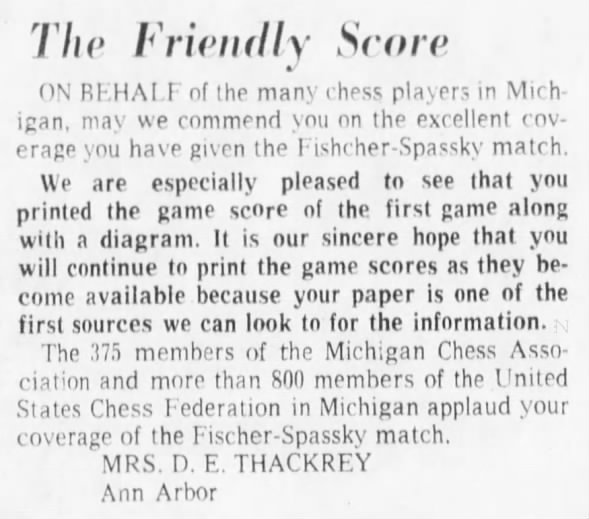 The Friendly Score 21 Jul 1972, Fri Detroit Free Press (Detroit, Michigan) Newspapers.com
The Friendly Score 21 Jul 1972, Fri Detroit Free Press (Detroit, Michigan) Newspapers.com
From The Age Melbourne, Victoria, Australia Friday, July 21, 1972 we get this bit of distortion, and one of the prime culprits behind spreading sensational fiction is none other than one of Fischer's arch rivals, Larry Evans. Larry Evans was Robert Fischer's “second” in Argentina during the Petrosian-Fischer quarter final tournament in 1971. Reported by numerous chess columnists in 1971, Evans threw a tantrum, because Fischer didn't need him. Evans returned home halfway through the tournament! Meanwhile, when the matter arose again about Evans serving as Fischer's second in Reykjavik, Fischer refused, according to Evans himself. One condition being that Fischer forbid Evans to write about him and/or publish.
Evans remained disgruntled from that time forward, using every available opportunity to bad-mouth and smear Fischer in the press and spread false stories, but always using Fischer's notoriety to bolster his own career and publicity interests. Such as this bit that Evans circulated without evidence, and mentioned in The Age, 7/21/1972, “In Washington, the usually conservative evening newspaper the STAR claimed earlier this week that White House aide Dr. Kissinger had made an 11th-hour intervention last Monday with a telephone appeal to Fischer not to walk out of the series. ([Really? Who's trying to claim Fischer was actually the one with the “attitude problem”? What about those rule-breaking Soviet and Icelandic organizers refusing to remove disruptive camera men and nearly jeopardized the tournament?]) The newspaper's special correspondent in Reykjavik, LARRY EVANS, solemnly reported that Dr. Kissinger told Fischer that America's honor was at stake, and that there was also the little matter of U.S. military bases in Iceland. IF THE REPORT WAS CORRECT…”
… and that's a big “If”.
Larry Evans was also complicit in spreading false news stories from August 14, 1972 that falsely alleged Nixon extended a White House invitation to Fischer. There was no truth to the claim and the New York Times even notes on August 7, 1972 when it did its own follow up investigation: “White House press aides declined comment on the reported invitation yesterday.” (See New York Times “White House Reported To Invite Fischer”.)
When the White House declines comment, it's further supporting evidence that Fischer was never extended an invitation, which justified the resentment Fischer often expressed toward Richard Nixon, in later years. Larry Evans reported falsely in his column, embellishing on Brad Darrach and Harry Benson's fables, that Nixon enlisted the services of Harry Benson (imagine that! Does the President of the most powerful nation in the world actually need, or think so highly of a couple of Life reporters, to enlist their aide to serve as White House couriers?!) yet, that's precisely what Larry Evans, Brad Darrach and Harry Benson released in the press, claiming Nixon sent the invitation through Harry Benson. Larry Evans followed up by claiming Fischer simply “forgot” it.
There is no evidence Kissinger, Nixon or the White House had anything at all to do with Fischer during his tournament in Iceland, unless Kissinger comes forward and personally confirmed he ever made a phone call. Short of that, nothing except a couple scurrilous reports by attention-craving columnists like Evans and Darrach.
The only confirmation beyond White House officials stating “No Comment” is a report released September 04, 1972 confirming: “Fischer received a congratulatory telegram from President Nixon. Aides to Fischer said the new champion shuffled his feet and broke into a big smile as he read the telegram, despite the fact that it did not extend a White House dinner invitation”.
Robert J. Fischer, an American, would justifiably grow bitter in his resentment toward Richard Nixon's refusal to give the due acknowledgement for the intellectual feat accomplished for American prestige, during the summer of 1972.
The Age Melbourne, Victoria, Australia Friday, July 21, 1972 - Page 9
Chess Fever Grips America From Roy Macartney, in Washington
The once-scorned game of chess has come out of the cobwebs and is sweeping the United States.
Little-known clubs are now crammed with players, duffers are hunching intently over boards in the parks, and newspapers, radio and television are giving the world chess championship in Reykjavik almost baseball World Series treatment.
In New York, the club where Bobby Fischer once played is charging $3 for the privilege of hearing experts analyse each move of the epic struggle in Iceland.
Not since Neville Cardus found cricket fields peopled with the gods of Greek mythology has such prose been lavished on what presumably is still a game.
The New York Times special correspondent wrote from Reykjavik that Fischer and Spassky “are able to mobilise the 16 pieces at their disposal, much as a Mozart could organise the notes at his disposal, into personalised patterns of logic and beauty.”
He said Spassky, “playing for his honor and what he considers the honor of the Soviet people”, was prepared for Fischer by a “phalanx of Soviet grandmasters”.
A “fighting mad” Spassky had Fischer defending desperately as he attacked “with his two bishops sweeping the long diagonals, with constant mating threats.”
“Spassky and Fischer use foils rather than sabres,” said the Times chess buff.
All this is inspiring young Americans at home, at least those youngsters who might gain on the chess board a recognition likely to elude them on the football field.
Chess clubs are never likely to threaten to replace saloons in America, one television commentator remarked.
But as the New York Times expert noted, “chess remains a game of infinite possibilities”.
The Los Angeles Times Los Angeles, California Friday, July 21, 1972 - Page 16
Inexplicable Blunder by Spassky Spells Defeat by Isaac Kashdan, Times Chess Editor
Bobby Fischer had a slight advantage after 26 moves of his fifth match game with Boris Spassky, but he could hardly have expected the world champion to resign two moves later.
Spassky's error on the 27th move was as inexplicable as the one committed by Fischer in the first game. It led to an even more disastrous finish.
Following is the diagram after Spassky's fatal move.
The queen retreated to B2 to protect the rook pawn. This was already guarded by Spassky's bishop, but Fischer had the option of Q-K1, to threaten the pawn for the second time.
Spassky must have completely overlooked Fischer's reply BxP, based on a keen tactical point. Having blocked his own bishop, Spassky could take the enemy bishop only with his queen.
That would leave his center unguarded for one moment, but Fischer needed nothing more. After 28. QxB, QxP, there would be two different threats of mate, and no adequate defense.
If Spassky moved his queen, then Fischer would exchange bishops and follow with QxP. Spassky would again be helpless.
Spassky had to play Q-K3 or Q-B3 on his 27th move, with the latter preferred. Fischer would still have tries for a win, but nothing decisive could be forced.
The opening followed the lines of the first game, until Fischer varied on his sixth move. Fischer avoided the balanced pawn formation and series of exchanges that had led to complete equalization in the earlier game.
Instead Fischer accepted a seemingly inferior position, allowing Spassky a more advanced pawn center. As compensation, Spassky's queen side pawns were separated and later proved weak.
Spassky's 11th move was probably inferior, as was the pawn exchange on the 13th move. The white KP became backward, as had the same pawn in the third game.
Spassky could not coordinate his pieces, and his two bishops were ineffective, blocked by pawns on both sides, the game was still tenable, however, until the final oversight.
Deseret News Salt Lake City, Utah Friday, July 21, 1972 - Page 9
What's Fischer's Problem? by Harold Lundstrom
Judging by the many snide remarks by generally unknowledgeable television commentators, newspaper reporters, and cartoonists, one would think that America's great chess hope, Robert (Bobby) Fischer was some kind of fiend from the netherworld. Really, no human being could be so perverse as he is pictured by some commentators.
Fischer's demands have been so extensively emphasized that non-chess players are interested, and wonder.
The highest amount of money ever divided by the players in a world-title match has been $14,000; Bobby was successful in getting it to $250,000.
Who ever heard of golf champions, fighters, or any other world championship match playing for peanuts?
What does money really mean to Spassky? He is a national hero of the USSR, handsomely supported by the Russian government. WHo supports Fischer in his long months of preparation or between tournaments in which even if he wins he receives only $1,000 or so?
Fischer goes to Iceland, or any other international tournament, with one “second,” period. In the case of the current match he also, it appears from the news, took a couple of lawyers. Who pays them?
Though the match and tournament rules permit a “second,” the facts are that Spassky can actually have 25 grandmasters as his “second.” Thus, while he goes to bed for the night following an adjournment, he has grandmasters analyzing every possible move all night.
Fischer has one, so that he probably spends part of the night himself analyzing.
Fischer is subject to the food and other accommodations available.
It has been reported many times that the Russian players arrive outside the USSR for their big games with a chef, a cook, a doctor, a nurse, a masseur, a physical therapist, a valet, and who knows what else.
And who goes with Bobby? One “second,” period.
Why was Bobby so fussy about the physical accommodations? One reason has to be that he has come violently to distrust the Russians.
Right or wrong, he is not sure but that the Russian grandmasters in the audience are signalling to Spassky. This is a vicious suspicion, of course, but it apparently is one that Fischer has come to.
There are tournament records, almost galore, of where the Russians, when playing each other, play for a draw (frequently on the 11th move), and then turn all their efforts to playing for a win against all others. This problem can't obtain in Iceland, but it probably is one of the reasons for Bobby's suspicions.
Surely, if Bobby weren't the great player he is, with most judging him to be the probable victor over Spassky, his demands would not be so seriously considered.
In any event, he has brought chess to the front page; he has secured a decent purse for a world title match; he has secured top accommodations and facilities for a world match.
Maybe Fischer's methods haven't always been those of a trained diplomat, but how else do you get through to the Russians?
One other factor: Fischer was only 17 in his first encounters with Spassky who was then an international grandmaster. Little wonder that Fischer's record of that time wasn't too impressive.
What's wrong with Bobby Fischer? Not enough to deserve the vicious television, radio, and press that he is receiving.
The Philadelphia Inquirer Philadelphia, Pennsylvania Friday, July 21, 1972 - Page 9
Bobby Fischer—The Area's Top Chess Set Salesman by Dominic Sama of The Inquirer Staff
Bobby Fischer's widespread publicity given to the chess match in Iceland have spurred a boom in the sale of chess sets and chessboards in local stores.
“Our chess sales were at a complete standstill before the match,” said Curtis Bronson, manager of Gimbels stationary department at 9th and Market streets.
“We were selling an average of two sets a month. Now, since the match, we've been selling three to four sets a week, and last week we sold seven sets.”
A SPOKESMAN for John Wanamakers, 13th and Market streets, said “the match has done a lot to promote sales.”
“We have newspaper clippings of the match, even those about Fischer's special chair being flown to the match, on display on the counter, and we feel sales have doubled,” he said.
A spokesman for Strawbridge & Clothier's nine area outlets said that since emphasis on the match has been displayed at the stores' counters, “We are probably selling about 20 to 25 sets a week at all our stores.”
STAN MALAMUT, owner of Stan's Hobbycraft & Toy Co., on Roosevelt Blvd., believes the publicity on the match will create a new surge of interest in the ancient game.
“At least I hope so,” Malamut said, “because I just ordered a whole load of chess sets… about eight dozen.”
The chess sets retail for $4 to $6 for the wood-carved and plastic sets and $125 to $500 for imported sets made of nickel or alabaster plated with gold or silver.
MEMBERS OF the Franklin Mercantile Chess Club have followed every move of the matches played so far.
“This is really one of the most exciting things that has happened in the chess community,” raved Tony Buczko, the club's general manager.
“Since the Fischer matches began, we've had a lot of strangers here to look in on our matches.”
CAPTION: PLAYING THE GAME everyone is interested in today, from left, Alex Agre, John House, Louis Hankin and Gordon Marcus concentrate on chess moves at a meeting of the Franklin Mercantile Chess Club at the St. James Hotel.
 Bobby Fischer -- The Area's Top Chess Set Salesman 21 Jul 1972, Fri The Philadelphia Inquirer (Philadelphia, Pennsylvania) Newspapers.com
Bobby Fischer -- The Area's Top Chess Set Salesman 21 Jul 1972, Fri The Philadelphia Inquirer (Philadelphia, Pennsylvania) Newspapers.com
The Miami News Miami, Florida Friday, July 21, 1972 - Page 6
Fischer Takes 5th, Evens Chess Match
(AP) Bobby Fischer won the fifth game of the world chess championship last night when Boris Spassky made a blunder after only 3½ hours of play. The score is now 2½-2½.
“It was just what we expected,” said Frank Skoff, vice president of the U.S. Chess Federation. “The general opinion of the American camp is that Fischer will win—even with the forfeit.”
Spassky was awarded the second game by forfeit on July 13, when Fischer refused to play because three ([disruptive men operating]) movie cameras were stationed in the hall. The cameras were removed before the third game, and Fischer has said he will not play if they are brought back.
Spassky defeated Fischer in the first game, then lost to him in the third, and the fourth was a draw. So in terms of actual play Fischer now has won two games to the Russian's one.
The sixth game in the series is scheduled for Sunday afternoon. With a win counting one point and a draw half a point, Fischer needs 12½ points to take the title and the winner's share — $153,125 of the $245,000 prize money. The Russian, as the defending champion, needs only 12 points to win.
The Baltimore Sun Baltimore, Maryland Friday, July 21, 1972 - Page 14
Letters to the Editor
Fischer's Behavior
Sir: I am completely behind Bobby Fischer in his *SEEMINGLY immature behavior with respect to Reykjavik.
If this were the Orioles, playing an international game, and they did not like the set-up, they would complain. Since, however, this is only chess ([and the Soviets and their worldwide disinformation network take the status of Soviet Imperial Supremacy and its exploitation of chess as a “Propaganda Vehicle” as Robert Fischer called it, very seriously]), his behavior has been called mad and immature, and served to anger the American public who are not interested in chess, but only interested in beating the Russians in something.
Bobby Fischer has gone to the limits of laying his honor down on the line for a principle, and to me this makes him a hero, and the hero of the American ideal. Let us all wish him the best of luck. Howard Kresin. Baltimore.
Chess Watchers
Sir: Your coverage of the chess championship match in Iceland has been outstanding! There are several chess players at our office, and your articles are eagerly awaited and relished by all of us. Keep up the good work. And, if possible, could you print the moves of each game as they are completed? Dick Haefner. Annapolis.
* Seemingly. The word seemingly refers to how things look on the surface — how they seem — and it often suggests there's more to the story.
The Capital Times Madison, Wisconsin Friday, July 21, 1972 - Page 17
Spassky Caught In Fischer Trap by Peter Dorman, State Chess Champion
The fifth game between World Champion Boris Spassky and his American challenger Bobby Fischer ended abruptly yesterday when the Russian grandmaster made a gross oversight on his 27th move. Spassky, his attention focused on intricate defensive maneuvering in a difficult position, overlooked a sharp trap, and resigned the next move.
This match, expected to be “the match of the century,” is turning into a war of nerves. With the possible exception of Fischer's crushing third-round victory, none of the games display the great talent that these players are known to possess. Instead, the results are achieved by surprise tactics. At this contest both Fischer and Spassky are evenly matched.
Spassky opened with the queen pawn for the third straight time in this match, and Fischer replied with the Nimzo-Indian Defense, an opening that served him well in the first game until the American ([disturbed by disruptive men hired to operate large, bulky television cameras which Fischer reported both seeing and hearing during the first game and Col. Edmondson of the USCF confirmed if Fischer's concentration was interrupted, he had every right to demand removal of the cameras, but Icelandic organizers saw fit to act as Soviet propagandists, breaking the rules then boldly flooding world media with false narratives, playing the victim]), blundered 25 moves later.
The champion's fourth move, however, was unexpected. It permitted Fischer to go in for a system pioneered by the young German master Robert Hubner, a defensive strategy that has been highly successful in recent years.
The ideal is to exchange Black's black-squared bishop for a white knight, and then to put as many Black pawns on black squares as possible. This increases the scope of activity for Black's remaining knights and bishop, while White's white-squared bishop becomes a pathetically restricted piece.
Surprisingly, Spassky did not have an adequate counter-strategy to follow. It is hard to believe that in their many months of preparation for this match Spassky and his Soviet colleagues could have ignored so crucial an opening line, yet this was apparently what happened.
As a result, Fischer's plans worked perfectly, and the champion soon found himself saddled with a difficult game, tied to the support of his weak pawns at K4 and QR4, and unable to develop any threats of his own.
The challenger played it cool, slowly maneuvering his pieces to better positions, first a knight, then his Queen. He traded off the most active White pieces, and began applying noticeable pressure all across the board.
Spassky became worried; he used up most of his allotted time trying to find a way to hold on. But he became so engrossed in his defensive stratagems that he failed to see a simple two-move trap laid by Fischer.
27. Q-B2 was the mistake that permitted … BxRP. Seeing that both 28. QxB QxKP (threatening two different checkmates) and 28. Q-Q2 BxB; 29. QxB QxKP must lose, Spassky decided it was time to take a walk.
As a matter of fact, his game was difficult in any event. Black could play to exchange queens, reaching an endgame that White would have to play extremely well to save. Spassky's best chance might have been 27. Q-B3 but then … Q-B2, threatening … N-N3 and … Q-B5, would still give Fischer a strong game. 28. P-N3 would lose to … N-R6ch 29. K-N2 QxQch; 30. KxQ P-N5ch; 31. K-N2 N-N4; 32. B-QB2 N-B6 and wins.
Maybe Fischer could have won this game anyway; maybe he couldn't. But after Spassky's fatal error, he didn't have to find out.
This victory, again with the black pieces, puts Fischer back in contention. The American blundered away the first game, the Russian did the same thing this round. Spassky drew a game he should have won; Fischer forfeited a game he should have played. The match stands even.
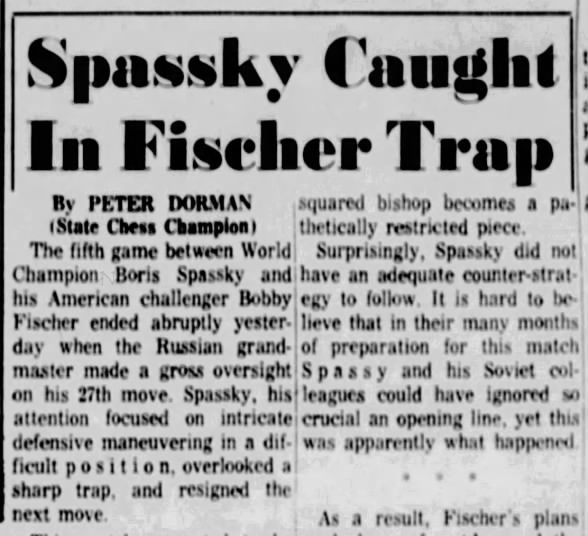 Spassky Caught In Fischer Trap 21 Jul 1972, Fri The Capital Times (Madison, Wisconsin) Newspapers.com
Spassky Caught In Fischer Trap 21 Jul 1972, Fri The Capital Times (Madison, Wisconsin) Newspapers.com
Newsday (Suffolk Edition) Melville, New York Friday, July 21, 1972 - Page 108
Even a Riot Can't Distract Chess Masters at Work
Patrons of the Chess House in New York follow moves of televised Fischer-Spassky match on their own boards. Their concentration wasn't even cracked by a riot out front, complete with policemen and questions.
 Patrons of the Chess House in New York 21 Jul 1972, Fri Newsday (Suffolk Edition) (Melville, New York) Newspapers.com
Patrons of the Chess House in New York 21 Jul 1972, Fri Newsday (Suffolk Edition) (Melville, New York) Newspapers.com
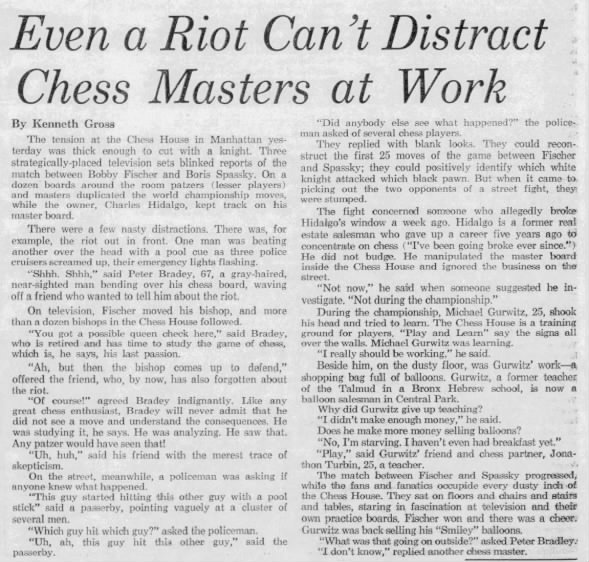 Even a Riot Can't Distract Chess Masters at Work 21 Jul 1972, Fri Newsday (Suffolk Edition) (Melville, New York) Newspapers.com
Even a Riot Can't Distract Chess Masters at Work 21 Jul 1972, Fri Newsday (Suffolk Edition) (Melville, New York) Newspapers.com
The Honolulu Advertiser Honolulu, Hawaii Friday, July 21, 1972 - Page 3
Honolulu Newsstand by Eddie Sherman
Chess nut John Narcisi has a cloth “board” set up in the City Room, following the Fischer-Spassky moves via info from the UPI wire. John, an artist who plays tournament chess (a C-player) believes it'll be Fischer hands down when it's all over…
The Pittsburgh Press Pittsburgh, Pennsylvania Friday, July 21, 1972 - Page 20
Strange Development
Bobby Fischer has had an uplifting influence on some college campuses, where the No. 1 dormitory game is now chess.
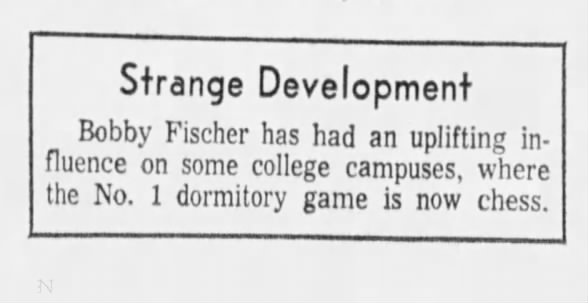 Strange Development 21 Jul 1972, Fri The Pittsburgh Press (Pittsburgh, Pennsylvania) Newspapers.com
Strange Development 21 Jul 1972, Fri The Pittsburgh Press (Pittsburgh, Pennsylvania) Newspapers.com












